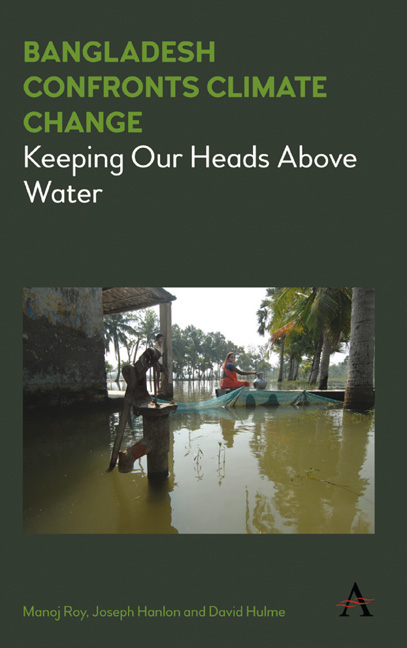Book contents
- Frontmatter
- Content
- List of Illustrations
- Abbreviations, Acronyms and Bangladeshi Terms
- Acknowledgements
- About the Authors
- Chapter One Actors, Not Victims
- Chapter Two How Will Climate Change Hit Bangladesh?
- Chapter Three Taking the Lead in Negotiations – and Moving Forward
- Chapter Four Sea Level Rise and the Vulnerable Coast – Where Farmers Know More than Engineers
- Chapter Five Saving Lives with Cyclone Shelters
- Chapter Six Living with Floods
- Chapter Seven Agronomists Keeping Ahead of Climate Change
- Chapter Eight No Climate Change Migrants – Yet
- Chapter Nine How Can the Privatized Megacity Cope with Climate Change?
- Chapter Ten Is Climate Change Only a Problem for the Urban Poor?
- Chapter Eleven Power – Political, Financial and Electrical
- Chapter Twelve Bangladesh on the Front Line of Climate Change
- Index
Chapter One - Actors, Not Victims
Published online by Cambridge University Press: 22 July 2017
- Frontmatter
- Content
- List of Illustrations
- Abbreviations, Acronyms and Bangladeshi Terms
- Acknowledgements
- About the Authors
- Chapter One Actors, Not Victims
- Chapter Two How Will Climate Change Hit Bangladesh?
- Chapter Three Taking the Lead in Negotiations – and Moving Forward
- Chapter Four Sea Level Rise and the Vulnerable Coast – Where Farmers Know More than Engineers
- Chapter Five Saving Lives with Cyclone Shelters
- Chapter Six Living with Floods
- Chapter Seven Agronomists Keeping Ahead of Climate Change
- Chapter Eight No Climate Change Migrants – Yet
- Chapter Nine How Can the Privatized Megacity Cope with Climate Change?
- Chapter Ten Is Climate Change Only a Problem for the Urban Poor?
- Chapter Eleven Power – Political, Financial and Electrical
- Chapter Twelve Bangladesh on the Front Line of Climate Change
- Index
Summary
Sumi is busy raising the floor of her small but comfortable house in Rupshaghat, Khulna, to make sure that her bed and TV set are not damaged when the area floods during the next monsoon. Khondaker Kabir is designing houses that local carpenters can build and also better withstand the stronger cyclones. Ainun Nishat was vice chancellor of BRAC University and led the Bangladesh negotiators at United Nations climate change conferences where a mixed government and civil society team won concessions from the developed world on payments for loss and damage caused by climate change. All three are Bangladeshis on the front line responding to climate change. They are not ‘victims’, but people who know climate change is real and that Bangladesh must adapt. And Bangladeshis have centuries of experience in adapting to environmental challenges.
Bangladesh is the eighth most populous country in the world but only slightly larger than England and the same size as the US state of Illinois. It is the most densely populated country in the world – with double the population density of Taiwan and triple that of the Netherlands and Rwanda. It has so many people because it lies on a rich delta and feeds itself. But that richness comes at a price. One of the largest deltas in the world, it is mainly flat and low lying. Water from the Himalayas and monsoon rains pours down the Ganges and Brahmaputra rivers, causing annual flooding. Some floods are benign and bring fertility, but others are hugely destructive and the rivers shift their courses eroding farmland and creating new islands. Cyclones coming north, up the Bay of Bengal, can cause massive damage. And the environment itself is hugely variable, from year to year and place to place. Bangladesh is only 600 km wide, but average annual rainfall ranges from 1.5 m in the west to 5 m in the east.
Indeed, Bangladesh has been and is shaped by geographic, environmental and political factors often entirely beyond its borders. Climate change is the newest of these factors. But centuries of coping, adapting and shaping the land and society have given Bangladeshis a strong understanding of what climate change will bring.
- Type
- Chapter
- Information
- Bangladesh Confronts Climate ChangeKeeping Our Heads above Water, pp. 1 - 14Publisher: Anthem PressPrint publication year: 2016



